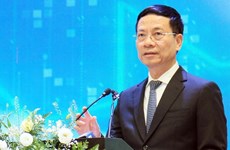ASEAN pushes for stronger regional economic integration
The establishment of the ASEAN Economic Community (AEC) as of late 2015
underscores the urgent of additional measures on building a freer and
more integrated economic structure for the region, said a Malaysian
official.
The establishment of the ASEAN Economic Community (AEC) as of late 2015
underscores the urgent of additional measures on building a freer and
more integrated economic structure for the region, said a Malaysian
official.
Speaking at a press conference after the conclusion of the 21 st ASEAN Economic Ministers’ Retreat in Malaysia on March 1, Malaysian Minister of International Trade and Industry Mustapa Mohamed stressed that regional economic integration will help ASEAN members overcome challenges posed by global economic changes.
He cited figures that showed intra-ASEAN trade in 2013 hit 608.6 billion USD, up from 458.1 billion USD in 2008, the year which the blueprint for AEC was devised.
The bloc expected their regional economy to grow 5.1 percent this year, compared to the forecast global rate of 3.5 percent. The expectation was attributable to a greater demand from developed economies, a strong economic recovery of the US and increasing domestic consumer spending thanks to dropping oil prices.
The minister said the focal tasks of the year for ASEAN are to further simplify customs procedures, harmonise their standards and liberalise the market of services while promoting trade and concluding the section on services and investment within the ASEAN-Japan comprehensive partnership agreement.
Malaysia is the chair of ASEAN in 2015, the target year for the bloc’s efforts to form an ASEAN Community on the three pillars, namely the ASEAN Political-Security Community, the ASEAN Economic Community and the ASEAN Social-Cultural Community.
Founded in 1967, the ASEAN groups Brunei, Cambodia, Indonesia, Laos, Malaysia, Myanmar, the Philippines, Singapore, Thailand and Vietnam.-VNA
Speaking at a press conference after the conclusion of the 21 st ASEAN Economic Ministers’ Retreat in Malaysia on March 1, Malaysian Minister of International Trade and Industry Mustapa Mohamed stressed that regional economic integration will help ASEAN members overcome challenges posed by global economic changes.
He cited figures that showed intra-ASEAN trade in 2013 hit 608.6 billion USD, up from 458.1 billion USD in 2008, the year which the blueprint for AEC was devised.
The bloc expected their regional economy to grow 5.1 percent this year, compared to the forecast global rate of 3.5 percent. The expectation was attributable to a greater demand from developed economies, a strong economic recovery of the US and increasing domestic consumer spending thanks to dropping oil prices.
The minister said the focal tasks of the year for ASEAN are to further simplify customs procedures, harmonise their standards and liberalise the market of services while promoting trade and concluding the section on services and investment within the ASEAN-Japan comprehensive partnership agreement.
Malaysia is the chair of ASEAN in 2015, the target year for the bloc’s efforts to form an ASEAN Community on the three pillars, namely the ASEAN Political-Security Community, the ASEAN Economic Community and the ASEAN Social-Cultural Community.
Founded in 1967, the ASEAN groups Brunei, Cambodia, Indonesia, Laos, Malaysia, Myanmar, the Philippines, Singapore, Thailand and Vietnam.-VNA











